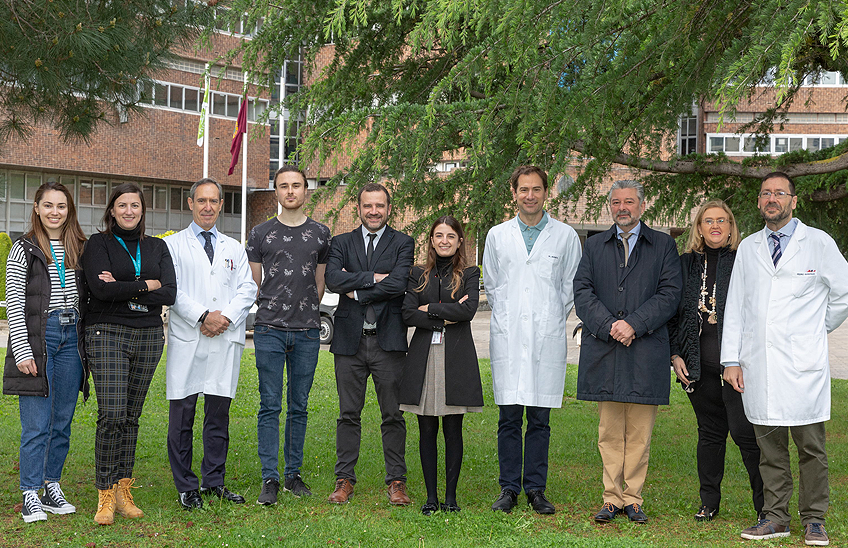research to personalize the diagnosis and treatment of people with diabetes subject 2
Genbioma Aplicaciones, Patia, the high school de research Sanitaria Biocruces and the University launch DiabeT2Predict, project funded by the Ministry of Science and Innovation with 1.7 million euros.

FotoManuelCastells/Various teams from the University of Navarra participate in the study. In the photo, researchers from the department of Endocrinology and Nutrition and the Clinical Trials Unit of the Clínica Universidad de Navarra; from CIMA LAB Diagnostics; and from the research center in Nutrition (CIN) of the University of Navarra.
12 | 05 | 2023
Applying precision personalized medicine by combining advances in the study of the microbiota and genetic tools to improve the control of diabetes subject 2. This is the goal of project DiabeT2Predict, a study promoted by a consortium multidisciplinary comprising Genbioma Aplicaciones, coordinator of project, Patia, the high school of research Sanitaria Biocruces, and several teams from the University of Navarra: the department of Endocrinology and Nutrition and the Clinical Trials Unit of the Clínica Universidad de Navarra; and CIMA LAB Diagnostics and the research center in Nutrition (CIN) of the University of Navarra, which coordinates the groups of work of the University of Navarra.
The project has been funded by the Ministry of Science and Innovation with 1.7 million euros and will combine the research at laboratory with the direct application of the results obtained in 230 volunteers.
"Our goal is to approach glycemic control in an individualized way, better understanding each patient and providing the treatment they need based on the patient's Genetics , but also on their intestinal microbiota," explains Pedro González Muniesa, researcher principal investigator of the study, in the part that corresponds to the University of Navarra.
To this end, the effectiveness of a probiotic/postbiotic formula, developed by Genbioma Aplicaciones, on the regulation of glycemia through the modulation of the intestinal microbiota will be analyzed, together with the application of genetic analysis tools. In addition, thanks to the tool prediction based on the information Genetics of each individual developed by Patia, it will be possible to diagnose those individuals who are unaware of suffering from diabetes, allowing each individual to make conscious decisions adapted to his or her casuistry.
A complementary, direct and safe nutritional intervention
"The prevalence of diabetes is currently a global pandemic with forecasts of growth to 780 million people by 2045. Specifically, Spain is already the second country in Europe with the highest incidence rate of people with diabetes in the adult population, with around 400,000 new cases each year," says Pedro González Muniesa. "It is therefore necessary to act strategically through new technologies that contribute to improving the control Degree in people with diabetes subject 2 and their quality of life, which will also help to reduce the healthcare expense , which represents approximately 9% of the total healthcare expense in Spain, some 13,430 million euros".
programs of study Recent studies have shown that the study of the intestinal microbiota is core topic for the prevention and progression of diabetes subject 2 since its alteration leads to dysfunctions in the glucose metabolism through different mechanisms such as insulin resistance and changes in intestinal permeability, among others. On the other hand, the study of the Genetics of each patient makes it possible to discern the pathophysiological heterogeneity of diabetes in different subtypes, as well as to analyze risk factors and carry out specific interventions to control the pathology and prevent future complications such as cardiometabolic diseases.
"The challenge of project focuses on generating knowledge on the mechanism of action of probiotics/postbiotics and their effectiveness based on the individual's genetic variants and through modulation of the gut microbiota. This will serve as a starting point for personalized guidelines to help improve diabetes control Degree from a new approach multidisciplinary ", says researcher.
Thus, supplementation with certain probiotics/postbiotics is emerging as a novel nutritional strategy complementary to medication and per diem expenses to help regulate blood glucose and control the progression of diabetes.
"The novelty of this study is that we do not intend to replace pharmacological treatment, but to provide each patient with all the information they need to change their lifestyle and eating habits, so that the treatment is as effective as possible," explains Pedro González Muniesa. Furthermore, since it is a nutritional intervention, carried out at high school of research Sanitaria Biocruces and at the University of Navarra, the transfer of the research from laboratory to the patients is much more direct and does not have side effects or interactions with drugs, making it safer.
Approach multidisciplinary public-private
To carry out the project project, a consortium of public and private companies that are leaders in the different fields of action required has been formed. Thus, Genbioma Aplicaciones will develop probiotic and symbiotic formulas based on a proprietary microbial strain, selected for its ability to stabilize hyperglycemia in a differential and sustained manner and modulate the intestinal microbiota that will be characterized by CIMA LAB Diagnostics of the University of Navarra in people with diabetes subject 2 (supported in previous preclinical programs of study ).
For its part, Patia will develop a specific tool to analyze the main genetic variants associated with the population with the disease. The effectiveness of the probiotic/postbiotic formulation will be validated in a multicenter clinical intervention essay in 230 people that will be carried out by the high school of research Sanitaria Biocruces, in Vizcaya, and the Clínica Universidad de Navarra.




